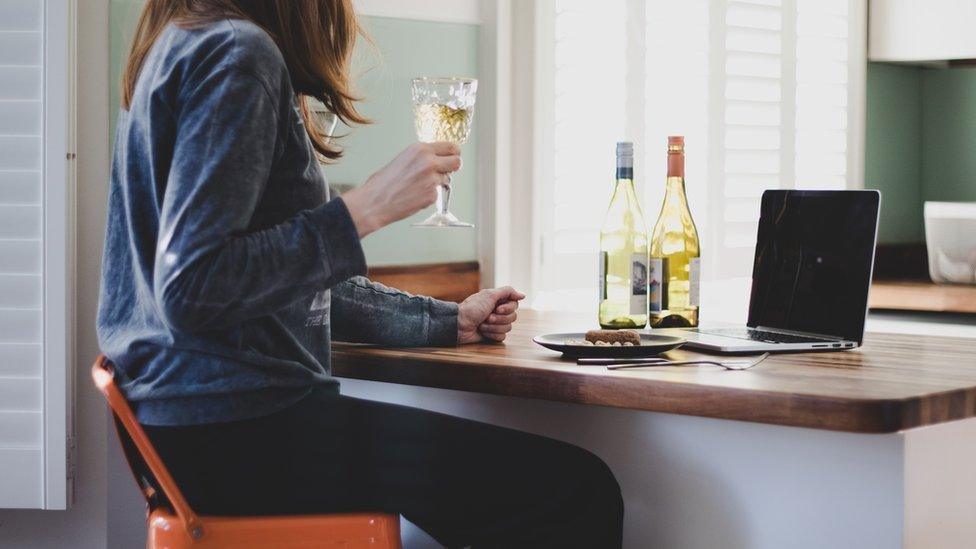Alcohol addiction: Newport woman's story of lockdown
- Published
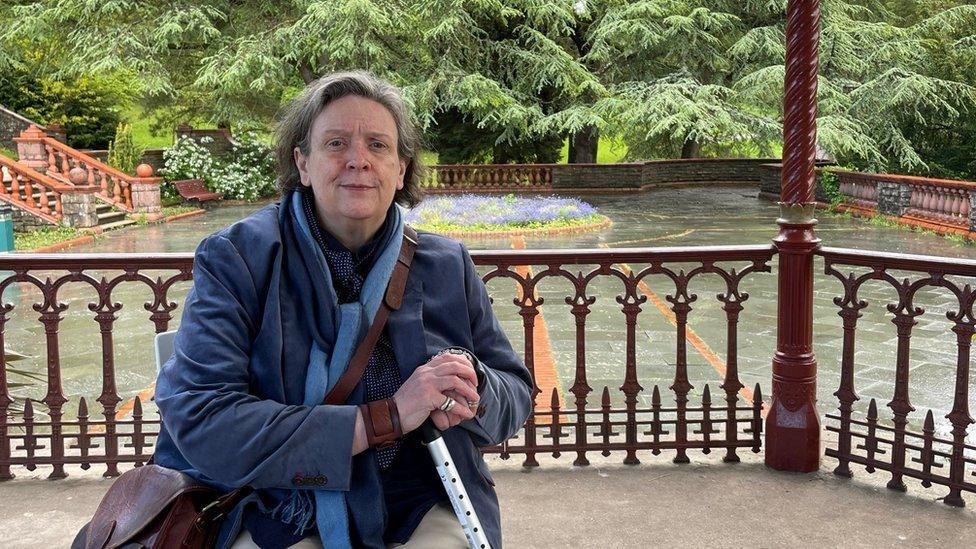
"Alcohol is a great deceiver," says Kathleen Edge
"In two days I would get through a litre of vodka and four bottles of wine. Easily.
"I knew it was wrong. I knew it was too much."
Before the pandemic Kathleen Edge from Newport, south Wales, had what she described as a healthy relationship with alcohol.
Like many people she started to drink a bit more when the stress, strain and boredom of lockdown started to take hold. And that relationship turned sour.
"It got to the middle of December and my friend came over to bring a delivery up, and it had got to the point where I could not walk any more… if I wanted to get between the bed and the sofa it was virtually crawling," she says.
"And I knew something was wrong. I said to him 'please just take the booze away - it is killing me'.
"I probably owe him my life. He told me I looked dreadful and that he would not leave until I had got help. Until I had got an ambulance."
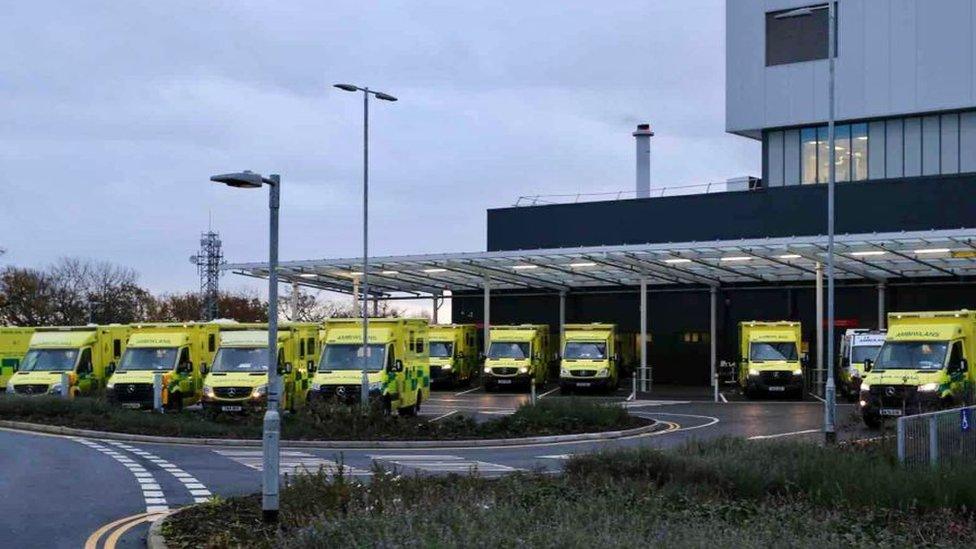
Kathleen was taken by ambulance to the Grange University Hospital where she met a liver specialist
It was at this point the seriousness of the situation really started to hit.
"They had to carry me out. It was very humiliating," Kathleen says.
"And I'm thinking 'you've got yourself into this position, there is Covid going on and you're calling an ambulance and this is really selfish'. But I needed an ambulance."
'I'm an alcoholic'
Kathleen went to the new Grange University Hospital near Cwmbran where she says she was lucky to see the liver specialist the next day.
"He said to me 'I think you have something to tell me. You need to say it out loud'.
"And I looked at him and said 'I'm an alcoholic'. That was the first time I had said it out loud and it was very freeing."
There are fears there could be more people out there like Kathleen who have not yet come forward to get help.
Figures from the Kaleidoscope Project, which works on drug and alcohol abuse, suggest an eight percentage point drop year-on-year in the number of people who have problems with alcohol being referred by doctors or other health professionals.
In the year to April 2021, 293 people were referred compared with 467 the year before. Self-referrals are down by more than four percentage points.
Support services are now waiting to see what happens - hoping for the best and prepared for the worst.
Nikki, a recovering alcoholic, describes how she stopped drinking during the pandemic.
Rondine Molinaro from the Gwent Drug and Alcohol Service draws parallels between the pandemic and another cataclysmic event, which surprisingly, perhaps does give some hope.
"If you look at the example of American soldiers returning from the Vietnam War in the 1970s, all the drugs services in the US were set up for and prepared for these large cohorts of servicemen who had become addicted to opiates and heroin in Vietnam, continuing their dependency on their return," she said.
"But that did not happen. I think 20% of the American troops were addicted to heroin in Vietnam, but as soon as they came back and their environment changed and those stresses had disappeared only 1% of those soldiers continued with a heroin dependency.
"Hopefully that's the same pattern that we will see, but we are prepared and we are waiting to see what happens over the next 12 months."
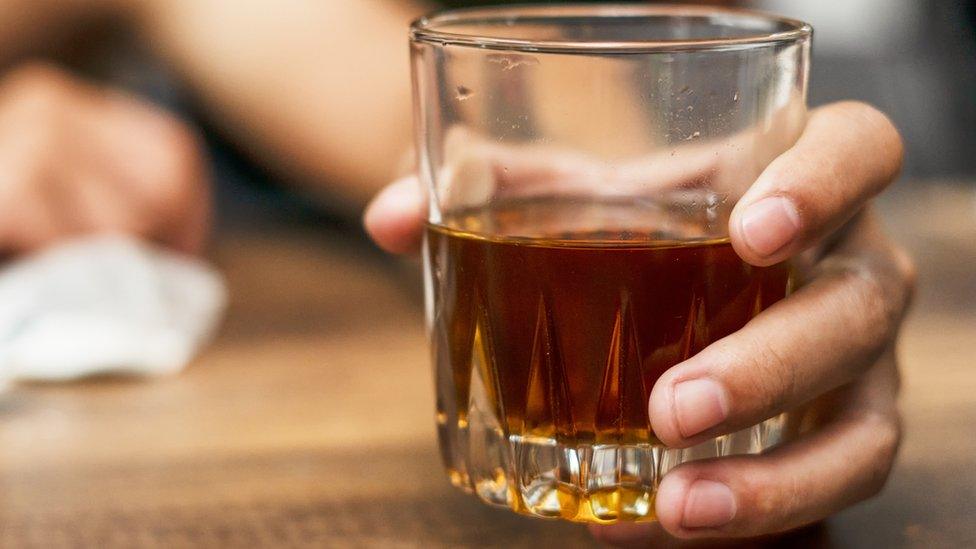
Support workers have noticed people from different backgrounds needing help for addiction
The service has also noticed a subtle change in the type of person seeking support during the Covid crisis.
Rondine explained: "We are definitely seeing more professional people coming in - they have jobs and they have incomes.
"Our alcohol liaison officer interviewed two gentlemen, who because of the pandemic had been put on furlough. They had income coming in, but no productive activity and no work to go to.
"They started to drink and became dependent on alcohol but did not know they were dependent on alcohol and actually ended up in A&E."
The Welsh government says it invests £55m every year on substance misuse.
In 2020-21 a further £4.8m was also made available to support the response to Covid.
Musician Nick Davis was in alcohol recovery when lockdown started and has had to find new ways to stay sober
Kathleen is now living with the long-term effects that alcohol has had on her body.
The damage to her liver caused severe swelling to her legs and she now has to walk with a stick.
But she says she is determined to seize her second chance.
"Alcohol is a great deceiver," she said.
"It is your best friend, it makes you feel fantastic, it makes you feel good, but it is almost as if alcoholism is grooming you and it can blow up in your face.
"It is all in my hands now. I make the decisions. I have been incredibly lucky. I want to get to the point where we do not talk about it any more. I don't drink and that's that."
The BBC Action Line has details of organisations that may be able to offer support for addiction
Listen live to Gareth Lewis on BBC Radio Wales and BBC Sounds from 17:00 BST to 18:30

MONUMENTAL MRS CAMPBELL: Wales' first black head teacher celebrated with iconic statue
MOTHERS, MISSILES AND THE AMERICAN PRESIDENT: The story of Greenham told like never before

- Published21 May 2020
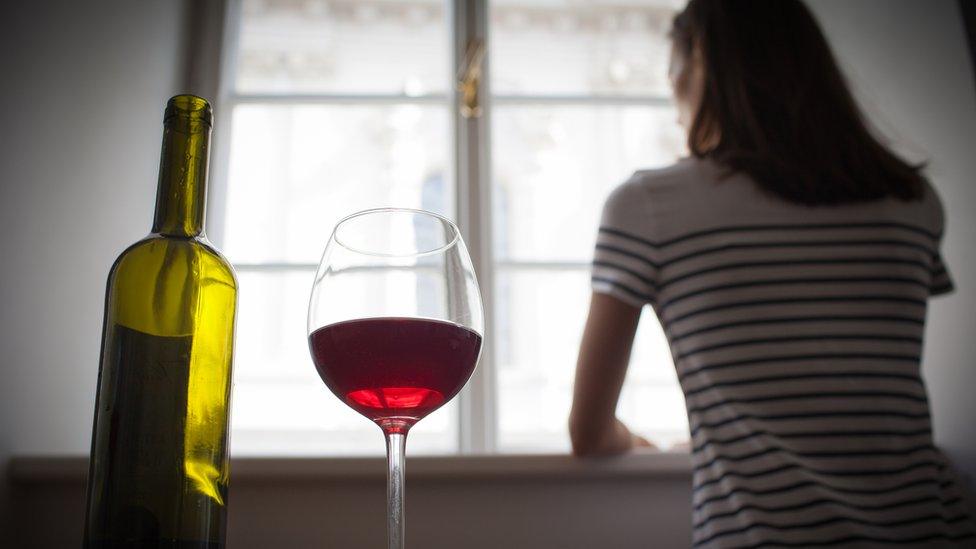
- Published6 May 2021
